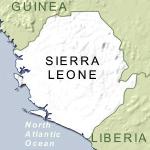28 December 2009

A Criminal Offense in Sierra Leone
Supreme Court upholds criminal libel act, says law poses no immediate danger to journalists
Sierra Leone's Supreme Court recently threw out a case aiming to repeal the country's criminal libel law, under which journalists and others can be jailed for libelous statements.
Sierra Leonean law is clear. Anyone who "maliciously" publishes defamatory material could be put in jail for up to three years, whether or not what they have written is true.
As Britain announces it will review its famously flexible libel laws, Sierra Leone's Supreme Court recently upheld the country's criminal libel act, saying the law posed no immediate danger to journalists.
The Criminal and Seditious Libel Act criminalizes statements that create disaffection against the government or damage the government's reputation.
The act does not allow truth as a defense, unless you can prove that publishing the truth is in the public interest.
Umaru Fofana heads Sierra Leone's Association for Journalists who brought the case to court. He says the act contradicts Sierra Leone's 1991 constitution that guarantees freedom of expression.
"We feel this a complete travesty of justice. We feel it is not only a travesty of justice because truth does not hold sway there, but people should not be criminalized for exercising their basic right to freedom of expression," Fofana said.
He says criminalizing libel is pointless when there are functioning civil mechanisms to judge defamation and slander allegations. He says the libel law is only used to gag journalists and repress independent and opposition voices.
Sierra Leone's Independent Media Commission was set up in 2007 to promote a free and pluralistic media and to protect the public interest from abuse by media houses.
In an address in August, president Ernest Bai Koroma reassured the commission of his government's commitment to enhancing freedom of the press. A former insurance salesman, Koroma came to power two years ago with a reform agenda, promising to do away with what some have described as a "draconian" libel law.
Sierra Leone's Information Minister, Ibrahim Ben Kargbo, says the law needed to be reviewed. But, Karbgo says, as soon as the case was brought to court, the matter was taken out of the government's hands.
"We are running a system of separation of powers. Once a journalist took the government to court, it became sub judice and we could not discuss it anymore," Kargbo said.
Now the Supreme Court has ruled, Kargbo says the government will discuss the issue again with journalists. The ministry of information is now focusing on putting together a Freedom of Information act.
For Fofana the balance has yet to be struck between freedom of expression and the right to reputation. He says the journalists' association will continue to push for repeal of the law.
"We are now resorting to going to the office of the president and to members of parliament for a repeal of this law. We are encouraging and appealing to the president to make real on his promise which he made during his campaign in 2006 that if he became president he was going to repeal this law," Fofana said.
He says this will be the association's biggest fight in 2010. He says if libel remains a criminal offense, then even a Freedom of Information law is futile. Journalists, he says, will come by information that is true, but will not publish it for fear of criminal proceedings.